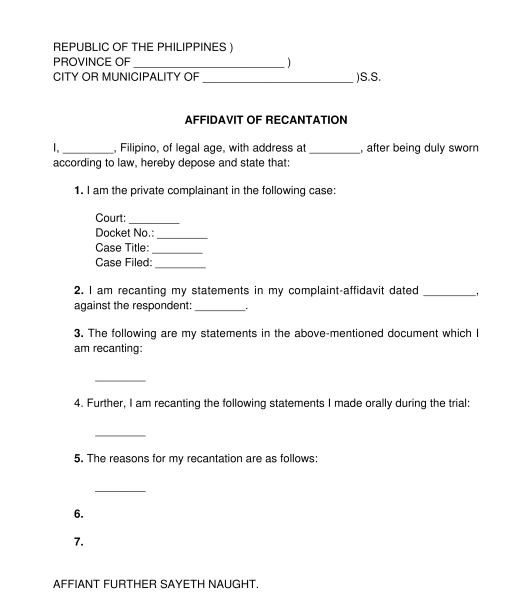 10/28/2025
10/28/2025

Answer a few questions and your document is created automatically.

Your document is ready! You will receive it in Word and PDF formats. You will be able to modify it.

 10/28/2025
10/28/2025
 Word and PDF
Word and PDF
 1 page
1 page
An Affidavit of Recantation is a document where a person (called the affiant) recants or withdraws a statement previously made due to the statement's falsity or inaccuracy. Further, the affiant swears on the fact that such statements are untrue and wants the same to be invalidated whether in whole or in part, in cases where it is already presented in a court of law during trial.
This affidavit is submitted to the court where a case is pending and after the affiant has presented his testimony during the trial. In other words, this document is used after testifying whether orally or through a complaint-affidavit, judicial affidavit, or affidavit of witness.
Before the presentation of his testimony, the proper document that should be used is an Affidavit of Desistance. In this document, the affiant desists from pursuing a particular case that has already been filed.
It must be noted that the submission of this affidavit does not have the effect of dismissing the case but will result in the nullification or striking out of the affiant's testimony from the court records. Further, this affidavit is meant to correct a statement previously made and was subsequently found to be false.
Note that making untruthful statements in court with the knowledge that said statements are false can lead to perjury charges or criminal charges for offering false statements in a judicial proceeding.
An Affidavit of Recantation contains the following information:
The document that shows the statements that the affiant wants to recant may be attached to the Affidavit of Recantation. Examples of these are complaint-affidavit, judicial affidavit, or affidavit of witness.
After completing the affidavit, at least two copies must be printed. Then both copies must be presented and signed in front of a notary public for notarization. One copy will be given to the notary public, and the other will be kept by the affiant and may be used for its intended purpose.
Affidavits are governed by the 2004 Rules on Notarial Practice. It should also be noted that making untruthful statements in a notarized affidavit may be punishable under the Revised Penal Code of the Philippines.
You fill out a form. The document is created before your eyes as you respond to the questions.
At the end, you receive it in Word and PDF formats. You can modify it and reuse it.
A guide to help you: What is an Affidavit?
Affidavit of Recantation - sample template
Country: Philippines